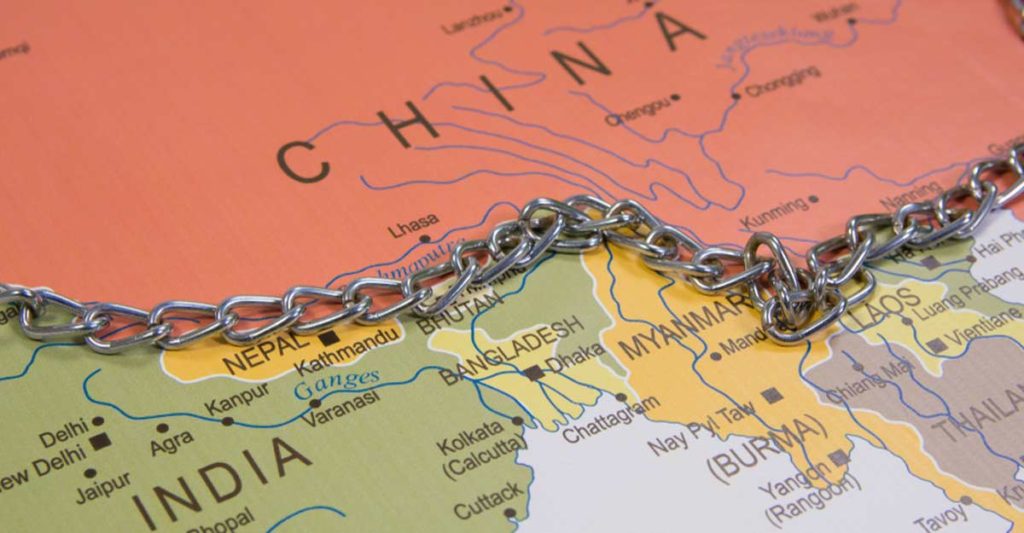China hindering India’s normal patrol across the Line of Actual Control: Ministry of External Affairs
The Ministry of External Affairs said all Indian activities have been carried out on its side of the border and that India has always taken a very responsible approach towards border management. At the same time, it said India was deeply committed to protect its sovereignty and security.

By PTI
India on Thursday said that China was hindering normal patrols by its troops along the Line of Actual Control in Ladakh and Sikkim and strongly rejected Beijing’s allegations that Indian forces trespassed into the Chinese side.
The Ministry of External Affairs said all Indian activities have been carried out on its side of the border and that India has always taken a very responsible approach towards border management. At the same time, it said India was deeply committed to protect its sovereignty and security.
India on Thursday said that China was hindering normal patrols by its troops along the Line of Actual Control in Ladakh and Sikkim and strongly rejected Beijing’s allegations that Indian forces trespassed into the Chinese side.
The Ministry of External Affairs said all Indian activities have been carried out on its side of the border and that India has always taken a very responsible approach towards border management. At the same time, it said India was deeply committed to protect its sovereignty and security.
Several areas in Ladakh and North Sikkim witnessed major military build-up by both the Indian and Chinese in the last few days, in a clear signal of escalating tension and hardening of respective positions by the two sides even two weeks after they were engaged in two separate face-offs.
He said all Indian activities were entirely on the Indian side of the LAC.
“In fact, it is Chinese side that has recently undertaken activity hindering India’s normal patrolling patterns. Indian side has always taken a very responsible approach towards border management,” Srivastava said.
“At the same time, we are deeply committed to ensuring India’s sovereignty and security.
The Indian troops strictly follow the procedures laid down in various bilateral agreements and protocols to resolve any situations which may arise due to difference in perception of LAC,” he said.
Without elaborating, the MEA spokesperson said both sides were engaged to address any immediate issue.
“The two sides have established mechanisms to resolve such situations peacefully through dialogue. Both sides remain engaged with each other to address any immediate issues,” he said.
In the midst of the escalating tension between the two ides, the US on Wednesday said the latest border dispute in Ladakh was a reminder of the threat posed by China.
China on Thursday dismissed as “nonsense” the comments by Alice Wells, the outgoing head of the South and Central Asia bureau in the US State Department.
It is learnt that local commanders of both the sides held at least three meetings in the last couple of days to bring down the tension but there was no positive outcome from the exchanges.
Sources said a top official in the government was in touch with Beijing as both sides were attempting to resolve the issue.
“In accordance with the consensus reached in Chennai, Indian side remains firmly committed to work for the common objective of maintenance of peace and tranquillity in border areas. This is an essential prerequisite to the further development of Indian-China bilateral relations,” said Srivastava.
Sources said the Chinese troops significantly increased their presence in areas around Pangong Tso Lake and Galwan Valley and even brought in sizable number of additional boats to the lake.
The two sides also have brought in additional troops to locations like Demchok and Daulat Beg Oldie, the sources said
The sources said the Chinese side has erected at least 40-50 tents in the Galwan Valley area following which India has also sent reinforcements to keep a hawk-eye vigil in the area.
The sources said the Chinese side had taken strong exception to India undertaking construction of key road around the Galwan river. India maintains that the area where the road and a bridge were being constructed belonged to the Indian side.
On May 5, around 250 Indian and Chinese army personnel clashed with iron rods, sticks, and even resorted to stone-pelting in the Pangong Tso lake area in which soldiers on both sides sustained injuries.
In a separate incident, nearly 150 Indian and Chinese military personnel were engaged in a face-off near Naku La Pass in the Sikkim sector on May 9. At least 10 soldiers from both sides sustained injuries.
The troops of India and China were engaged in a 73-day stand-off in Doklam tri-junction in 2017 which even triggered fears of a war between the two nuclear-armed neighbours.
The India-China border dispute covers the 3,488-km-long Line of Actual Control, the de-facto border between the two countries.
China claims Arunachal Pradesh as part of southern Tibet while India contests it.
Both sides have been asserting that pending the final resolution of the boundary issue, it is necessary to maintain peace and tranquillity in the border areas.
China has been critical of India’s reorganisation of J-K, and has particularly criticised New Delhi for making Ladakh a union territory. China lays claim over several parts of Ladakh.
Prime Minister Narendra Modi and Chinese President Xi Jinping held their first informal summit in April 2018 in the Chinese city of Wuhan, months after the Doklam standoff.
In the summit, the two leaders decided to issue “strategic guidance” to their militaries to strengthen communications so that they can build trust and understanding.
Modi and Xi held their second informal summit in Mamallapuram near Chennai in October last year with a focus on further broadening bilateral ties.